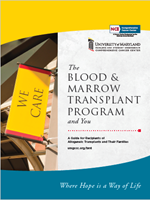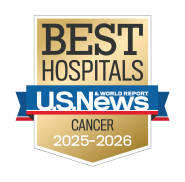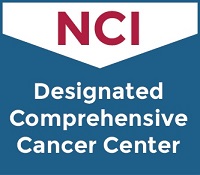Getting an Allogeneic Stem Cell Transplant
In an allogeneic transplant, the patient receives bone marrow or peripheral blood (the blood circulating through your body) stem cells from another donor, often a sibling.
These cells find their way to the bone marrow and begin to produce a new population of blood cells. Through this process, your bone marrow and immune functioning returns to normal.
At UMGCCC, an allogenic peripheral blood stem cell transplant (PBSCT) is an option only if the donor is related to you. When your donor is unrelated, you will receive a bone marrow transplant (BMT). Learn more about BMT and PBSCT.
How an Allogeneic Transplant Works
Once you find a donor and they’re approved and cleared, you’ll be ready to schedule your stem cell transplant.
Some of the process will be on an outpatient basis, then you’ll be admitted to the hospital when you’re closer to your transplant date. Prepare to be in the hospital for 14-18 days.
Preparing for the Transplant
- You and your donor will go through a series of tests to make sure a transplant will be safe.
- A few days before stem cell collection, your donor will get injections to increase their white blood cell count and multiply their stem cells, called “mobilization.” (This step might be skipped for BMTs.)
- You will be admitted to the transplant unit to receive a conditioning regimen of chemotherapy (and sometimes radiation) for 1-8 days.
Stem Cell Collection (Apheresis)
PBSCT:
- Your donor will come to the hospital either the day of or the day before the transplant.
- The donor's blood is removed and circulated through a special machine that collects stem cells, in a process that takes about 4-5 hours to complete.
- The collected stem cells are processed and frozen until they are transplanted back to you, usually within a day.
- There is a possibility that bone marrow may need to be harvested from the donor to get enough stem cells for the transfusion.
BMT:
- Bone marrow will be collected from the donor’s hip bones, in a procedure lasting about 90 minutes.
- For a related donor, this procedure will be done at UMGCCC.
- If the donor is unrelated to you and does not live nearby, the bone marrow is collected at a facility near where the donor lives. The cells are frozen and delivered by special medical courier to our transplant unit.
Transplantation
- The stem cells are given to you through a catheter, taking generally 1-2 hours.
- They travel to the bone marrow where they begin to produce new white blood cells, red blood cells and platelets. This is called "engraftment” and can take up to 10-16 days.
- Through blood tests and bone marrow samples (aspirations), the team will check if engraftment is working.
Graft-Versus-Host Disease
Your transplant coordinator will talk to you about graft-versus-host disease (GVHD), a common complication after an allogeneic transplant occurring in 20-60% of people who receive donor stem cells. GVHD occurs when a special kind of immune cell in your new stem cells (T cell) launches a response against your body. It can be mild or severe and can affect the skin, liver, GI tract, eyes, lungs and mouth.
Acute GVHD develops soon after transplant. It can be as mild as a skin rash and can be treated. Chronic GVHD develops months after transplant and can be permanent.
Post-Transplant Care
After your transplant, you’ll be at high risk of infection because of your dramatically low WBC, RBC, and platelet counts. You will likely need red blood and platelet transfusions. When your WBC count starts to increase, the team will talk about when you can leave.
Re-admissions to the BMT unit for post-transplant complications are a common part of the process. The transplant team will closely monitor you for complications.
Your Allogeneic Transplant Guide
Our Guide for Recipients of Allogeneic Transplants and Their Families gives you all the details about getting an allogeneic stem cell transplant at UMGCCC: 
- Who is part of your transplant team
- What the pre-transplant tests include
- What's available on the transplant unit and its policies
- What to expect the day of your transplant
- What healing and recovery look like
- How to successfully manage your post-transplant care
Make a Referral
Get in touch with us when you want to refer a patient, talk to one of our doctors or ask about a clinical trial.
Contact Us
To talk to us about getting help with an allogeneic stem cell transplant, call 410-328-7904 to make an appointment.


